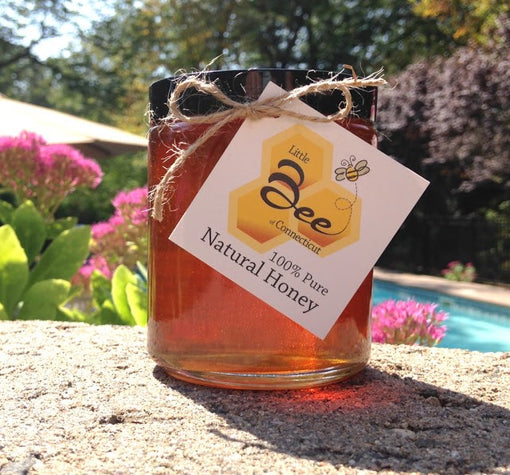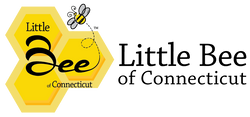
- Article published at:
- Article author: Web Dev
- Article tag: beekeeping
- Article comments count: 0
Do you love local honey? Are you SURE you’re purchasing local honey?
More and more people are understanding the health benefits of local honey – from ingesting the natural pollen for allergy control, to antibacterial properties for wounds, to a soothing cup of hot honey and lemon for a sore throat. They are also understanding the plight of the honey bee through national coverage by CNN, Time, National Geographic, to name a few and are buying to help support local beekeeping.
My favorite local honey is of course… Little Bee of Connecticut, mainly, because I am the beekeeper. I’m proud to say that Little Bee of Connecticut honey is truly, pure local honey. I know what went into harvesting it and that it hasn’t been processed or otherwise adulterated in any way. I can’t stress enough, when buying your local honey, know your honey source, and if at all possible, know your beekeeper.
Just because it’s honey being sold locally doesn’t necessarily mean it is local honey, or raw honey, or even pure honey.
Truly local honey means that the bees should be collecting the nectar and pollen in the local area not just harvesting the honey locally. The label might say the town of the beekeeper and it might be local to you. This doesn’t necessarily mean that the honey is local. Some beekeepers rent out their hives for pollination of crops. The hives will be transported, possibly to other regions of the country for several weeks/months and placed in a field. In this situation the pollen and nectar sources may not be local to the hives original home. When the hives do return home and the honey harvested, it should not be considered local honey. Be sure to ask the seller/beekeeper where the hives are located and are they rented out for pollination. If they are, be sure that the hives stayed local. If not, it’s not local honey.
Pure honey is produced entirely from pollen and nectar collected by bees. However, by feeding the bees sugar syrup during the honey producing/harvesting season, beekeepers can increase the the amount of “honey” produced. The bees are not able to tell the difference between the sugar syrup and real nectar, so they will collect it and convert it into “honey”. “Honey” produced by this method is not considered real honey by most beekeepers. It may look like honey and have a taste of honey, but I feel it is deceptive to sell this as honey, as you are selling honey flavored sugar syrup. Always ask if the beekeeper feeds their bees sugar during the honey producing season (May to September). If they do, then you may not be buying real local honey.
The process used by the beekeeper to harvest the honey can have an impact to the look, flavor, and most importantly the benefits of local honey. Most honey found in the supermarket is commercial honey and comes from multiple sources. The honey has likely been pasteurized by heating to almost 160F. This allows the honey to be easily filtered, bottled, and gives it a uniform look. Fine filtering can remove the beneficial pollen from the honey. Heat treating can impact the color, flavor, all the natural vitamins, living enzymes, and other nutritional elements. Be sure to ask how your local honey was harvested to ensure that it has not been filtered or heated so that it retains all the benefits you are buying it for.
Little Bee of Connecticut’s hives are all located in Southbury and Newtown, CT, and are not rented for pollination. We do not feed our bees sugar during the honey producing/harvesting season. At harvest time, the honey goes direct from the honey comb, through a mesh strainer to remove wax pieces, and directly into our jars without any other processing. The way honey should be. Pick up a jar of Little Bee Honey, compare it to your grocery store bottle, and taste the difference.
Little Bee of Connecticut is a small family owned apiary located in Southbury, CT. The premise behind Little Bee of CT is a simple one: provide locally produced, unique products from the hive, while educating their customers on what we can all do to help support honey bee survival. Founded by Scott Priore, it quickly became apparent that beekeeping would be a passion versus just a “hobby”. All their products are handmade in small batches and only include simple, minimal ingredients. They offer a variety of honey and beeswax-based products including Hand Rolled Beeswax Candles, Hand/Body Salve, Lip Balms, Solid Perfumes, Sea Salt Body Scrubs, as well as Locally Produced Honey.
Learn More
